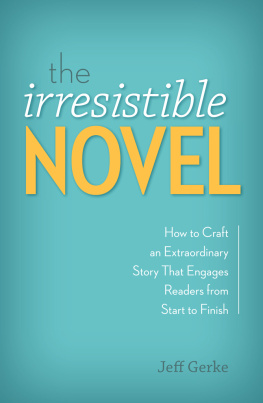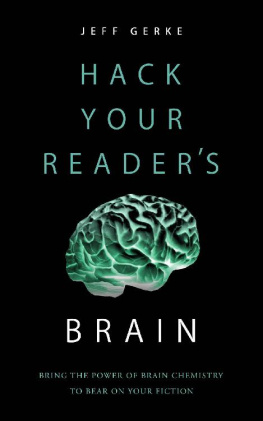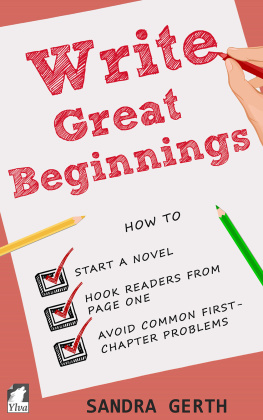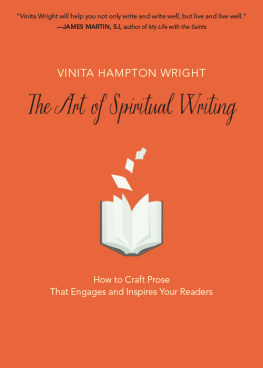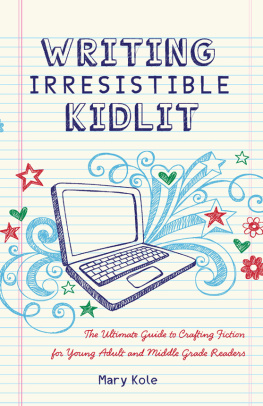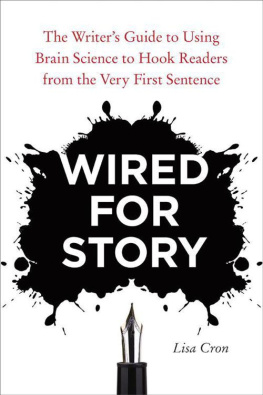Contents
Guide
the
irresistible
NOVEL

WritersDigest.com
Cincinnati, Ohio
DEDICATION
To all the writers of fiction who have been harmed by the so-called rules of fiction:
May you find freedom and healing, and may you sweep your readers away.
table of
CONTENTS
INTRODUCTION
What makes you love a novel?
Think of your very favorite two or three novels. Take a minute to contemplate what you love about each one. Is there anything in common between them that springs to mind? Is it that theyre all character-driven stories? Are they all of a certain genre? Do they all involve a coming of age for the hero? Is the writing uniformly beautifulsensuous prose that is a work of art in and of itself? Are they all set in a certain time or place?
For the moment, take off your critics hat. Remove all the training youve gained as a writer or editor or critique partner, and think only about what made your heart soar and your imagination leap and your mind stretch, or whatever it was that made you love it. Do this even if the book youre thinking of was something you read, or was read to you, when you were very young. Chances are, the thing that captivated you about a story when you were younger is exactly the thing that captivates you now, or that you wish would captivate you.
If you love fiction, then something sparked that love.
For me, it was my mother singing bedtime songs to me that were not your typical lullabies. They were folk songs that told a story and always sent my mind flying. So while other kids were nodding off to Twinkle, Twinkle, Little Star, I fell asleep with movies in my head about Tom Dooley, and the Sloop John B, and the defenders of the Alamo fighting ol Santa Ana with a gleam in their eyes. I saw the doomed cowboy on the streets of Laredo, and I saw the woman coming by night to her lovers grave while wearing a long black veil.
I didnt know what those musical stories were doing to me. All I knew was that I wanted more of it. Soon I became a reader of fiction. I found novels that gave me that same rush of wonder, of transport. And years later, not only did I want more of that for myself, I wanted to do for others what had been done for me. So I became a novelist and screenwriter and artist.
For me, the pursuit of fiction is all about transport. I want to go there and meet that person and see that impossible sight and live that adventure. I want to be inside the adventure, feeling as if its happening to me. And I want to give my readers the same gift.
What is it for you? What is it about your favorite novels that makes them your favorites? If you like each one for different reasons, keep zooming out. Look for one common theme that links your favorites together.
As with the other questions in The Irresistible Novel, its fine if your answer is different from my answer. Theres no right or wrong about why you like a novel. It simply is. But I want to help you see what you love as a reader of fiction. Because when you know that, you know what to do as a writer of fiction.
PARALYSIS OF THE RIGHT BRAIN
If youve studied the art and craft of fiction for very long, I can pretty much guarantee that youve encountered a certain frustration.
Perhaps you read a best-selling book on how to write fiction, and the author builds a compelling case for how exactly to do Xmaybe description or dialogue or character creation or how to build a scene. You put the book down and apply that advice to the novel youre writing.
Fast-forward a few months, and you encounter another fiction expert. Maybe you go to a writers conference and hear someone speak on the same topic, only this person presents an equally compelling case for why you should never do X the way the other expert said you should do it.
Sound familiar? Bringing up some anxieties?
Now what are you supposed to do? Youve written more than half of your manuscript according to the first teachers advice, but now youre convinced that you shouldnt have done it that way at all. Do you finish the book the old way and then write the next book in the new way? Do you go back and rewrite the whole thing so its in line with the new way? Do you leave it half and half?
Lets say you do the agonizing work of making it all line up with the new way. You finish your rough draft and take it to your critique group, and they all say you shouldve written ityou guessed itthe way you originally had.
So you tear out your hair and go back, making the full manuscript line up with how the original teacher said you should do it. You show the revised manuscript to some agents and acquisitions editors, and guess what they say? Yup: You shouldve written it the way the second teacher said.
With no hair left to pull out, you hire a freelance editor to tell you what to do, and she says both ways are wrong and you should really change it to this third way. Which is a way your crit group says you should never follow and is precisely the subject of an article in this months Writers Digest magazine, which espouses yet a fourth way of doing it and says that all other ways are to be avoided unless you want to get laughed at.
And thats just on one issueour dear old X. The typical novelist has heard conflicting expert advice on more than a dozen major aspects of fiction craftsmanship. Your rough draft may please this agent in ways A, Q, and W but displease him on issues C, M, and Yespecially Y. The next agent loves the way you did Y but says you absolutely have to change W and especially A and Q.
I see this all the time. I have taught at more than fifty writers conferences, and at every one I have found dozens of novelists who were confused and frustrated by this state of affairs.
And the poor author thinks its her problem! Now, on some level, she may suspect that writinglike painting or dancingis highly subjective and that there are many styles that may be considered appropriate. She suspects that there might be rules that are useful for beginners that can be jettisoned by masters.
But thats not how fiction craftsmanship is presented by the experts. Based on how they present these, she comes to believe, as any rational person would, that there is a set of codified, eternal, and mutually agreed-upon laws of fiction that can be learned and mastered. She also believes, understandably, that the fiction experts teaching at conferences and writing books on craftsmanship have been inducted into this secret society, given the hidden knowledge, and authorized to give out this information to writers wanting to learn to conjure with it.
She believes, in other words, that the fiction teaching shes hearing must all be reconcilable and coherent, and if she cant figure out how to simultaneously do and not do X, its her fault. Since everyone around her seems to know whats going on, she zips her lip, looks over her manuscript in progress, sees where she has done or not done X, Y, and Z
And despairs.
While it would be helpful if there were a set of codified and mutually agreed-upon laws of fiction, and while some of us would like to believe that there is, there isnt. We cant imagine a scenario in, say, motorcycle repair in which you both must and must not adjust the throttle in a certain way. How could a house ever be built if the wiring must both be and not be hooked up according to someones instructions? What if a swing set came with multiple booklets with irreconcilable assembly directions? It would be chaos.

